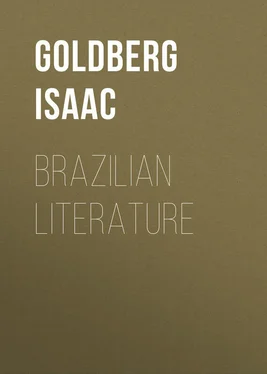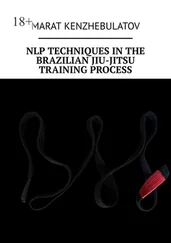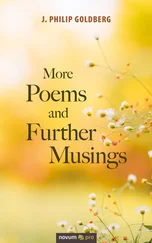Isaac Goldberg - Brazilian Literature
Здесь есть возможность читать онлайн «Isaac Goldberg - Brazilian Literature» — ознакомительный отрывок электронной книги совершенно бесплатно, а после прочтения отрывка купить полную версию. В некоторых случаях можно слушать аудио, скачать через торрент в формате fb2 и присутствует краткое содержание. Жанр: foreign_antique, foreign_prose, на английском языке. Описание произведения, (предисловие) а так же отзывы посетителей доступны на портале библиотеки ЛибКат.
- Название:Brazilian Literature
- Автор:
- Жанр:
- Год:неизвестен
- ISBN:нет данных
- Рейтинг книги:4 / 5. Голосов: 1
-
Избранное:Добавить в избранное
- Отзывы:
-
Ваша оценка:
- 80
- 1
- 2
- 3
- 4
- 5
Brazilian Literature: краткое содержание, описание и аннотация
Предлагаем к чтению аннотацию, описание, краткое содержание или предисловие (зависит от того, что написал сам автор книги «Brazilian Literature»). Если вы не нашли необходимую информацию о книге — напишите в комментариях, мы постараемся отыскать её.
Brazilian Literature — читать онлайн ознакомительный отрывок
Ниже представлен текст книги, разбитый по страницам. Система сохранения места последней прочитанной страницы, позволяет с удобством читать онлайн бесплатно книгу «Brazilian Literature», без необходимости каждый раз заново искать на чём Вы остановились. Поставьте закладку, и сможете в любой момент перейти на страницу, на которой закончили чтение.
Интервал:
Закладка:
The language of Brazil, then, is not the Portuguese of Lisbon. From the phonological viewpoint there is less palatalization of the final s and z than is customary in Portugal; Brazil has a real diphthong ou , which in Lisbonese has become a close o or the diphthong oi . Its pronunciation of the diphthong ei is true, whereas in Lisbon this approximates to ai (with a as in English above , or like the u of cut ). Neither is the grammar identical with that of Portugal. “The truth is, that by correcting ourselves we run the danger of mutilating ideas and sentiments that are not merely personal. It is no longer the language that we are purifying; it is our spirit that we are subjecting to inexplicable servility. To speak differently is not to speak incorrectly… To change a word or an inflexion of ours for a different one of Coimbra 17 17 The famous Portuguese seat of learning at Coimbra.
is to alter the value of both in favor of artificial and deceptive uniformity.” 18 18 João Ribeiro. A Lingua Nacional. São Paulo. 1921.
Brazilianisms, so-called, make their appearance very early; they are already present in the letters sent by the Jesuits, as well as in the old chronicles. New plants, new fruits, new animals compelled new words. Native terms enriched the vocabulary. Of course, as has happened with us, often a word for which the new nation is reproached turns out to be an original importation from the motherland. One of the oldest documents in the history of Brazilianisms appeared in Paris during the first quarter of the XIXth century and is reprinted by João Ribeiro as a rarity little known to his countrymen; it formed part of the Introduction à l’Atlas ethnographique du globe , prepared by Adrien Balbi and covering the races and languages of the world. The Portuguese section was entrusted to Domingos Borges de Barros, baron and later viscount de Pedra Branca, a warm advocate of Brazilian independence, then recently achieved. This, according to Ribeiro, is supposed to constitute the “first theoretical contribution” to the study of Brazilianisms. It is written in French, and because of its documentary importance I translate it in good measure:
“Languages reveal the manners and the character of peoples. That of the Portuguese has the savor of their religious, martial traits; thus the words honnête , galant , éate , bizarre , etc., possess a meaning quite different from that they have in French. The Portuguese tongue abounds in terms and phrases for the expression of impulsive movements and strong actions. In Portuguese one strikes with everything; and when the Frenchman, for example, feels the need of adding the word coup to the thing with which he does the striking, the Portuguese expresses it with the word of the instrument alone. One says, in French, un coup de pierre ; in Portuguese, pedrada (a blow with a stone); un coup de couteau is expressed in Portuguese by facada (a knife thrust) and so on…
“Without becoming unidiomatic, one may boldly form superlatives and diminutives of every adjective; this is done sometimes even with nouns. Harshness of the pronunciation has accompanied the arrogance of expression… But this tongue, transported to Brazil, breathes the gentleness of the climate and of the character of its inhabitants; it has gained in usage and in the expression of tender sentiments, and while it has preserved all its energy it possesses more amenity…
“To this first difference, which embraces the generality of the Brazilian idiom, one must add that of words which have altogether changed in accepted meaning, as well as several other expressions which do not exist in the Portuguese language and which have been either borrowed from the natives or imported into Brazil by the inhabitants of the various oversea colonies of Portugal.”
There follow some eight words that have changed meaning, such, for example, as faceira , signifying lower jaw in Portugal, but coquette in Brazil; as a matter of fact, Ribeiro shows that the Portuguese critics who censured this “Brazilianism” did not know the history of their own tongue. In the XVIIth century faceira was synonymous with pelintra , petimêtre , elegante (respectively, poor fellow, dandy, fashionable youth); it became obsolete in Portugal, but in Brazil was preserved with exclusive application to the feminine. The Brazilian words unknown in Portugal are some fifty in number upon the Baron’s list.
Costa finds that Portuguese, crossing the Atlantic, “almost doubled its vocabulary, accepting and assimilating a mass of words from the Indian and the Negro. Through the influence of the climate, through the new ethnic elements, – the voluptuous, indolent Negro and Indian, passionate to the point of crime and sacrifice, – the pronunciation of Portuguese by the Brazilian acquired, so to say, a musical modulation, slow, chanting, soft, – a language impregnated with poesy and languor, quite different from that spoken in Portugal.” 19 19 Varnhagen, in his Introduction to the Florilegio da Poesia Brazileira (Vol. I of the two volumes that appeared in Lisbon in 1850, pages 19-20), has some interesting remarks upon the early hispanization of Portuguese in Brazil. Among such effects of Spanish upon Brazilian Portuguese he notes the transposition of the possessive pronouns; the opening of all vowels, thus avoiding the elision of final e or converting final o into u ; the pronunciation of s at the end of a syllable as s instead of as sh , which is the Portuguese rule.
A new milieu and a racial amalgamation that effect changes in speech are bound soon or late to produce a new orientation in literature. The question whether that literature is largely derivative or independent is relatively unimportant and academic, as is the analogous question concerning the essential difference of language. The important consideration for us is that the law of change is operating, and that the change is in the direction of independence. Much has been written upon the subject of nationalism in art – too much, indeed, – and of this, altogether too large a part has been needlessly obscured by the fatuities of the narrowly nationalistic mind. There is, of course, such a thing as national character, though even this has been overdone by writers until the traits thus considered have been so stencilled upon popular thought that they resemble rather caricatures than characteristics. True nationalism in literature is largely a product of the writer’s unconscious mind; it is a spontaneous manifestation, and no intensity of set purpose can create it unless the psychological substratum is there. For the rest, literature belongs to art rather than to nationality, to esthetics rather than to politics and geography. 20 20 The wise Goethe once said to Eckermann: “The poet, as a man and citizen, will love his native land; but the native land of his poetic powers and poetic action is the good, noble and beautiful, which is confined to no particular province or country, and which he seizes upon and forms wherever he finds it. Therein is he like the eagle, who hovers with free gaze over whole countries, and to whom it is of no consequence whether the hare on which he pounces is running in Prussia or in Saxony… And then, what is meant by love of one’s country? What is meant by patriotic deeds? If the poet has employed a life in battling with pernicious prejudice, in setting aside narrow views, in enlightening the minds, purifying the tastes, ennobling the feelings and thoughts of his countrymen, what better could he have done? how could he have acted more patriotically?”
The consideration of literature by nations, then, is itself the province of the historian of ideas; it is, however, a useful method of co-ordinating our knowledge and of explaining the personality of a country. If I bring up the matter here at all it is because such a writer as Sylvio Romero, intent upon emphasizing national themes, now and again distorts the image of his subject, mistaking civic virtue and patriotic aspiration for esthetic values, or worse still, deliberately exalting the former over the latter. The same Romero, for example, – a volcanic personality who never erred upon the side of modesty, false or true, – speaks thus of his own poetry: “… I initiated the reaction against Romanticism in 1870…” And how did he initiate it? By calling for a poetry in agreement with contemporary philosophy. Now, it is no more the business of poetry to agree with contemporary philosophy than for it to “agree” with contemporary nationalism. Goethe, reproached for not having taken up arms in the German War of Liberation, “or at least co-operating as a poet,” replied that it would have all been well enough to have written martial verse within sound of the enemy’s horses; however, “that was not my life and not my business, but that of Theodor Körner. His war-songs suit him perfectly. But to me, who am not of a warlike nature and who have no warlike sense, war-songs would have been a mask which would have fitted my face very badly… I have never affected anything in my poetry… I have never uttered anything which I have not experienced, and which has not urged me to production. I have only composed love-songs when I have loved. How could I write songs of hatred without hating!” Those are the words of an artist; they could not be understood by the honourable gentleman who not so long ago complained in the British parliament because the poet laureate, Mr. Robert Bridges, had not produced any appropriate war-verse in celebration of the four years’ madness.
Интервал:
Закладка:
Похожие книги на «Brazilian Literature»
Представляем Вашему вниманию похожие книги на «Brazilian Literature» списком для выбора. Мы отобрали схожую по названию и смыслу литературу в надежде предоставить читателям больше вариантов отыскать новые, интересные, ещё непрочитанные произведения.
Обсуждение, отзывы о книге «Brazilian Literature» и просто собственные мнения читателей. Оставьте ваши комментарии, напишите, что Вы думаете о произведении, его смысле или главных героях. Укажите что конкретно понравилось, а что нет, и почему Вы так считаете.












